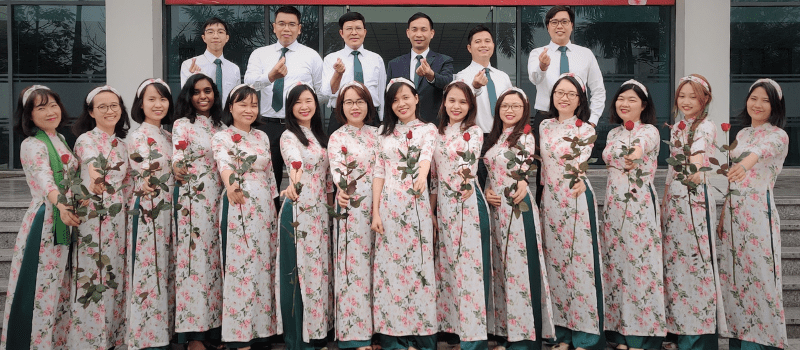This blog was contributed by VWB/VSF alumni VETS volunteer, Nafhtari Wanjiku.
As part of Veterinarians Without Borders/Vétérinaires Sans Frontières' (VWB/VSF) Volunteers Engaged in Technical Solutions (VETS) project mandate, we are working with local partners to help build capacity within the communities in which VWB/VSF volunteers are currently operating. This includes creating inclusive, gender-responsive, long-term solutions to help alleviate challenges created by poverty and food insecurity through a One Health approach — healthy animals, healthy people, and a healthy environment. Within the agricultural scope, this includes building from VWB/VSF 's expertise along with that of our partners, to develop and deliver programs that benefit women and girls and continues to expand its expertise through ongoing evaluation and monitoring. It also includes ensuring the proper management of animals and the environment to help prevent the spread of zoonotic diseases between animals and humans, or animals and the environment.
 Ann Njeri Mwangi on her farm at Ngoru in Mukurwe-ini Nyeri, Kenya
Ann Njeri Mwangi on her farm at Ngoru in Mukurwe-ini Nyeri, Kenya
The adoption of technologies for sustainable dairy farming among small-scale farmers in Kenya is still low, despite their proven benefits and the investment in terms of time and other resources employed in their dissemination. According to the Kenya Dairy Board's 2019 estimates, productivity per cow in Kenya remains low (7-9 litres per day), mainly due to poor feeding, among other animal management practices. This weak dairy performance is closely linked to low technology adoption by farmers, which slows productivity growth in the agriculture sector, (Wolgin 2001, Mwambu et al. 2004, Byerlee et al. 2005, Diao et al. 2006; Christiansen et al. 2007). Many factors that include farmers’ lack of skills and their perception on the cost of technologies have been blamed for this. However, in order to meet the new challenge of meeting the fast, growing demand for food in the face of the adverse climatic conditions and dwindling agricultural land, making even the smallest changes on farms will count.
VWB/VSF’s work in Kenya aims to ensure that farming is done in a sustainable way that deliberately protects the environment and involves everyone, particularly women and girls. In order to quicken this approach, 16 dairy farms have been identified to help influence other farmers' trust and behaviour towards adopting training lessons. This is done by showing these farmers the benefits of this approach. One of these farmers is Ann Njeri Mwangi, a 34-year-old mother who has three mature cows. Ann has one acre of land where she grows fodder for these cows. The yield from the land has been very little, causing her to buy much of the fodder that her cows would eat.

Ann Mwangi(right) speaks to Nafhtari Wanjiku (left), the alumni VWB/VSF Animal Nutritionist Volunteer, about maize silage in the bags.
Ann was enrolled in VWB/VSF's VETS Project in October 2021. During this time, she had two lactating cows that were in their late lactation period, producing six litres of milk on average each day. She was facing many challenges, the most prominent one, just like many of her neighbours, being the lack of sufficient quality fodder. You could easily notice this from the poor body condition of the cows and leftovers in the feeding trough. After taking Ann through a series of training sessions on fodder production and conservation, cow comfort, feeding dry and lactating cows, managing calves and heifers, mastitis and farm biosecurity measures, gender issues and reproduction, we have seen tremendous improvement on her farm — especially within cow productivity. One of the cows, with an estimated live weight of 410 kg, that would calf down later in December of the same year, had peaked at producing 17 litres in the previous lactation. This time, the cow was nicely steamed up and after calving down, we prepared her a dedicated feed ration that comprised of maize silage, napier grass, Rhodes grass hay and concentrates that saw her increase her milk production to 32 litres of milk in one day.
“It was like a dream," said Ann. "I could not believe my cow gave me 30 litres of milk. Although the trainings were really time consuming, I cannot complain now because I have seen the benefits. I now know how to make good maize silage, and how much dairy meal to give to my cows for them to produce a lot of milk. This silage will help me a lot because the other two cows will be calving down soon," Ann added.
Since this training, Ann has become a sensational farmer in her village. By mid February 2022, she'd hosted one group of farmers on her farm where she took that opportunity to speak about the changes she has done.
“In the beginning, I had doubts, but after improving the cows’ sleeping area, made silage and followed what our trainers told us, I think I have become a better farmer and my cows are happy because they are giving me more milk," said Ann. "After seeing what was happening on the farm, my husband looked for a farmhand. Now, I have employed one person to help me with the milking and feeding the cows,” Ann explained. She is determined to produce more fodder for her cows and make more silage as she says this has allowed her to find time for other activities on the farm. Initially, Ann spend a significant amount of time cutting and carrying fodder each day.
Getting farmers like Ann to buy into training lessons, and allowing others to visit their farms to learn, has been be crucial in helping to match the rate of food demand with the demand for supply.
VWB/VSF's VETS program is generously funded by Global Affairs Canada.
Interested in learning more about VWB/VSF's work in Kenya? Click here!




